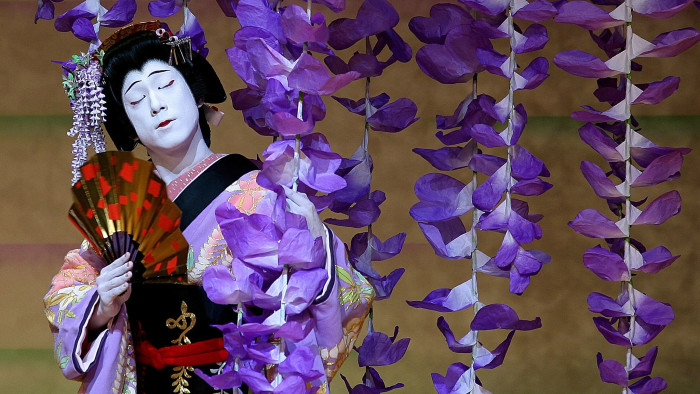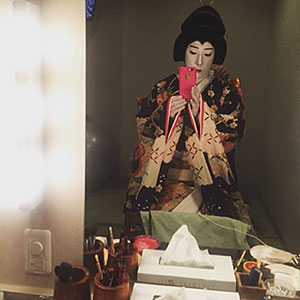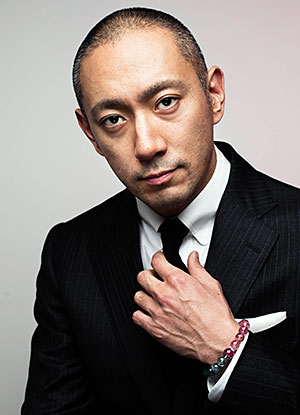Kabuki star Ebizō Ichikawa takes a firm line on tradition

Simply sign up to the Life & Arts myFT Digest -- delivered directly to your inbox.
Ebizō Ichikawa XI, son of the revered Danjūrō Ichikawa XII, great-grandson of the esteemed Koshiro Matsumoto VII, is a heartthrob in a kimono and heir to perhaps the greatest family name in kabuki theatre. Yet he takes a firm line on tradition.
“Just because something is part of a nation’s generational cultural heritage,” he says, “doesn’t mean the audience will just watch it, or stay awake during the performance if they do go.”
The comment has no edge of humour. The all-male performance art of kabuki, the 400-year-old stylised dance-drama of Japan, desperately needs a new audience and Ebizō, as he is known to his millions of devoted fans, has appointed himself the man to seek it out both at home and, via shows in the US next month, abroad. Best of all, he suggests, would be for him to lead the opening ceremony of the 2020 Tokyo Olympics, evangelising his art form before a global audience of billions.
He takes a moment, after a morning of business-related engagements, to reassume the role of the country’s most brilliant, arrogant, theatrical sex symbol. Bred from toddlerhood to follow 10 generations of his family into the most demanding of lives on the stage, this is the part he plays to perfection.
Now aged 38, Ebizō has, since his first public performance at the age of six, made a speciality of being precisely what Japan hoped he would be. Over time, he has become acidly critical of those expectations, particularly as Japanese media has gossiped more intrusively about his private life. In 2010, soon after he was hospitalised in a nightclub brawl, he was cajoled by convention into appearing on live television to apologise to the public for his involvement. He has had to work hard and consciously, he says, to escape a Japanese ethic of entertainment “that makes slaves of its entertainers”.
One facet of that has been Ebizō’s energetic use of social media: in a striking break with expectations, he uses Facebook to catalogue details of his daily life and those of his young daughter and son. Like celebrities elsewhere in the world, Ebizō has recognised social media as a mechanism for retaining control over a public persona that can often become hijacked. In Japan, he suggests, that hijacking is particularly pernicious.

When we meet in a hotel in central Tokyo, Ebizō has spent the earlier part of the afternoon posing for an advertising shoot — for a Japanese company paying handsomely to ally itself with a face that has spent a career gurning exquisitely between hero, courtesan, lothario, crone and mythical beast. Beyond the classical stage, he has also starred in film, in anime, on television.
Freed from the glare of a lens, he rolls his neck and winces. He arches his back and winces. He flexes his arms above his shoulders and winces. These are the aches and pains, he explains, of a craft that judges excellence by millimetre-accurate replication of movement. He riffs on those demands, using infinitesimal shrugs and glares to show how, in one play, a grieving woman might become transformed into a demon, and how a bare slab of matting must be imagined into a river “without a moment of compromise”.
His chin and eyes perform little orbits before the whole face settles at a slight tilt. Everything, like so much else in the world of Ebizō, has the feel of something endlessly and obsessively rehearsed.

He returns to the issue of kabuki’s future. The problem is twofold: the performances and the people watching them. The problems that both he and the wider professional world of kabuki face in 2016, he says, are the problems of Japanese demography and society that confront the wider economy.
The ingredients for a golden era of kabuki are all there. In 2013, after years of refurbishment, the stunning new Kabuki-za theatre opened in Tokyo’s Ginza district. Kabuki directors have begun making small but significant tweaks to the classics to revive the art’s reputation as a medium of satire. In Ebizō, and the generation of younger stars who grew up alongside him, there is a rich pool of talent.
But the paying customers are dying of old age. The seats at Ebizō’s morning and matinee performances are increasingly occupied, he says, by women in their 70s and 80s: the section of society that has the time and money to come to the theatre.
“Theatre in Japan is supported by elderly women. Sadly, Japanese men cannot come to see performances of kabuki because they are so tied up with work. Evening kabuki performances start at 4.30pm, so if you work, you can’t see them. Housewives cannot come until they have reached an age when they have finished with child-rearing.”
In an effort to remedy this, Ebizō established his own production company three years ago and took a double gamble: he took kabuki into theatres throughout regional Japan and ensured that the opening pluck of the samisen, the Japanese musical instrument, would not sound until 7pm.
Although the experiment has been limited in scope, the effect has been profound. “Men come because they can finally make it to the theatre after work. Young people come to watch. The audiences are so different and their reactions are so different from what I have become used to,” he says.

He readjusts his body to form the perfect archetype of a rapt young audience member suddenly freed from the bonds of the traditional matinee schedule and watching kabuki for the first time.
“They sit forward in their seats. They sometimes get so wound up in the performance that they forget to applaud. Some people respond well, some people respond badly. You have some who will enjoy it once, and others who will keep coming back.”
But that, he says, is only part of the challenge. Kabuki, along with so much else that falls under the designation of “tradition” in Japan, is under threat.
The idea of protecting tradition, he says, is the intellectual equivalent of what he calls sloppy accounting. As Japan’s population shrinks and ages, the job of protecting traditions must be minutely subdivided into all the constituent elements to be successful.
“Take Louis Vuitton. Until recently it was run by the Louis Vuitton family, but now it is run by a talented man called Arnault. You can do that on a continent, because it is big [and there are good people available]. But Japan is an island. In one sense, that has protected its traditions and kept the country in the same shape, but maybe not always. Tradition is not just related to family, but is about handing things down.”
It is a thought that brings Ebizō to his immediate family. When his father died in 2013, he says, a piece of kabuki died with him. “There were parts of kabuki that only he owned.” So will his son, now aged two, start the long path to kabuki stardom when he turns five?
“I have no desire. It is something for him to decide. I want him to do it,” says Ebizō, his face shifting between three characters in three sentences.
‘An Evening of Japanese Traditional Theatre’, Carnegie Hall, New York, March 1. carnegiehall.org
Photographs: Reuters; Ko Sasaki
Comments